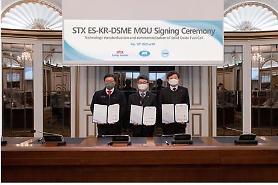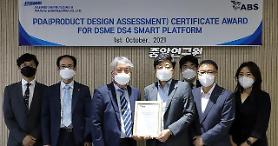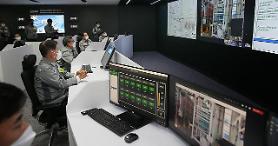
[Courtesy of Korean Register]
SEOUL -- South Korea's maritime classification society will work with Daewoo Shipbuilding & Marine Engineering to jointly develop technology for autonomous ships ahead of competitors. The shipbuilder aims to launch a large autonomous commercial ship installed with its smart ship platform in 2025.
DSME and other shipbuilders are trying hard to develop autonomous ship technologies that can replace crew decisions with intelligent and autonomous systems integrating artificial intelligence, Internet of Things (IoT), big data, and sensors that would open an era of next-generation high-value-added ships.
Under an agreement designed to preempt autonomous ship technology, KR said it would proceed with the certification of DAN-V, a test smart ship built by Daewoo Shipbuilding & Marine Engineering (DSME) using its smart ship platform DS4 that secured certification from the American Bureau of Shipping (ABS), an international classification society, in October 2021.
"As the shipbuilding industry is gradually developing smart ships, autonomous ships, and unmanned ships, it's a good opportunity to apply our guidelines to test ships equipped with autonomous operating systems," KR's research center head Kim Dae-hun said in a statement on April 4.
The shipbuilder thinks ABS' certification would simplify the process of applying DS4 to ships without separate verification as the solution could be applied immediately to actual ships. DSME will conduct step-by-step demonstrations through operational tests in the sea. "We will solidify DSME's in the autonomous ship market that will be commercialized in the future," said DSME's R&D institute head Choi Dong-kyu.
DSME is the industry-first to obtain "product design assessment (PDA)" certification in the field of cyber safety. The company would provide a smart ship solution that guarantees safety against external cyber threats, as well as systems necessary for maintaining and repairing various data that help ships operate optimally. DSME regards cybersecurity as a key element of autonomous ships.
As South Korean shipbuilders work hard to develop smart ship technologies, the demand for cybersecurity protection has grown because of the rapid convergence of operational information and communication technologies. Cybersecurity technology is designed to protect data and software from outside threats.
Smart ships are expected to revolutionize the landscape of ship design and operations. Along with efficiency in traffic, smart ships can minimize human errors that caused about 70 to 80 percent of marine accidents. Smart shipping can be divided into unmanned ships ruled by an operator from a control center onshore and autonomous ships which use a computer on board that takes decisions about the route, speed, fuel consumption, maintenance and even mooring in the harbor.
Copyright ⓒ Aju Press All rights reserved.



